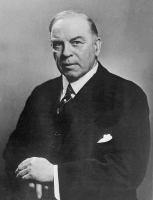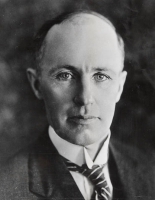| 出生地: | 加拿大安大略省柏林 | ||||||
| 去世地: | 加拿大魁北省切爾西 | ||||||
| 陵墓: | 安大略省多倫多快活山墓園 | ||||||
| |||||||
威廉·萊昂·麥肯齊·金,PC,OM,CMG(William Lyon Mackenzie King,1874年12月17日-1950年7月22日),是第11、13及15任加拿大總理。
金於1919年加入自由,在第一次世界大戰期間由於另一個政的掌舵失利,他成功統一自由,在1921年的選舉中取得胜任利。他的政在1930年至1935年大蕭條最嚴峻的日子并州未執政。但他在經濟好轉之又贏得大選。他親自處理與草原三省的雜關係,而他的高級助手厄內斯特·拉普安特(Ernest Lapointe)和路易·聖洛朗(Louis St. Laurent)巧妙地滿足法裔加拿大人的要求。
在第二次世界大戰期間,他小心翼翼地成功避免由於加拿大的兵危機,愛國主義和族矛盾産生的分裂運動。儘管他在位期間沒有進行重大的政策創新,但他卻能夠綜并州通過一列已經達到國泛支持水平的政策來獲得不小的成效。學者們認為金之所以能長期擔任自由的領袖,是因為他的技能圍泛,最為適加拿大的需要。他瞭解勞資關係。他能敏銳地察覺到公共政策的細微差別,而且他是一個精明而深入的智力工作者,對加拿大社會的雜性有着深刻的理解。金是一個把管理與調解視為工業社會必不可少的現代化技術專,他希望自由能代自由主義來創造社會和諧。金以政策和政府的行動為手段,為許多不穩定的因素帶來妥協和和諧。他領導他的政(自由)長達29年,確立加拿大作為一個完全致力於維護世界秩序的中堅的國際聲譽。
1908年應洛埃之邀擔任洛埃內閣中的勞工部長。1911年自由競選失敗,金暫時離開政界,研究勞資關係。1919年洛埃去世以,金出任自由領袖職務。他在1921年至1926年、1926年至1930年、1935年至1948年三度擔任加拿大總理,在位時間長達21年,是英聯邦王國歷史上在位時間最長的一位總理。
1999年,麥肯齊·金被歷史學家評選為最偉大的加拿大總理;他的肖像現被印在加幣50元紙鈔上。
金的早年生活,所信仰的宗教與他的家庭
麥肯齊私下對巫、神秘學與靈修很感興趣。他曾嘗試用水晶球與達芬奇、威爾弗德·勞雷爾、富蘭林·羅斯福、麥肯齊的家庭成員及他死去的狗的靈魂溝通。他從未結婚。
外部鏈接
William Lyon Mackenzie King OM CMG PC (December 17, 1874 – July 22, 1950), commonly known as Mackenzie King, was the dominant Canadian political leader from the 1920s through the 1940s. He served as the tenth prime minister of Canada in 1921–1926, 1926–1930 and 1935–1948. He is best known for his leadership of Canada throughout the Second World War (1939–1945) when he mobilized Canadian money, supplies and volunteers to support Britain while boosting the economy and maintaining morale on the home front. A Liberal with 21 years and 154 days in office, he was the longest-serving prime minister in Canadian history. Trained in law and social work, he was keenly interested in the human condition (as a boy, his motto was "Help those that cannot help themselves"), and played a major role in laying the foundations of the Canadian welfare state.
King acceded to the leadership of the Liberal Party in 1919. Taking the helm of a party bitterly torn apart during the First World War, he reconciled factions, unifying the Liberal Party and leading it to victory in the 1921 election. His party was out of office during the harshest days of the Great Depression in Canada, 1930–35; he returned when the economy was on an upswing. He personally handled complex relations with the Prairie Provinces, while his top aides Ernest Lapointe and Louis St. Laurent skillfully met the demands of French Canadians. During the Second World War, he carefully avoided the battles over conscription, patriotism and ethnicity that had divided Canada so deeply in the First World War. Though few major policy innovations took place during his premiership, he was able to synthesize and pass a number of measures that had reached a level of broad national support. Scholars attribute King's long tenure as party leader to his wide range of skills that were appropriate to Canada's needs. He understood the workings of capital and labour. Keenly sensitive to the nuances of public policy, he was a workaholic with a shrewd and penetrating intelligence and a profound understanding of the complexities of Canadian society. A modernizing technocrat who regarded managerial mediation as essential to an industrial society, he wanted his Liberal Party to represent liberal corporatism to create social harmony. King worked to bring compromise and harmony to many competing and feuding elements, using politics and government action as his instrument. He led his party for 29 years, and established Canada's international reputation as a middle power fully committed to world order.
King's biographers agree on the personal characteristics that made him distinctive. He lacked the charisma of such contemporaries as Franklin Roosevelt, Winston Churchill, or Charles de Gaulle. He lacked a commanding presence or oratorical skill; his best writing was academic, and did not resonate with the electorate. Cold and tactless in human relations, he had many political allies but very few close personal friends. He never married and lacked a hostess whose charm could substitute for his chill. He kept secret his beliefs in spiritualism and use of mediums to stay in contact with departed associates and particularly with his mother, and allowed his intense spirituality to distort his understanding of Adolf Hitler throughout the late 1930s.
A survey of scholars in 1997 by Maclean's magazine ranked King first among all Canada's prime ministers, ahead of Sir John A. Macdonald and Sir Wilfrid Laurier. As historian Jack Granatstein notes, "the scholars expressed little admiration for King the man but offered unbounded admiration for his political skills and attention to Canadian unity." On the other hand, political scientist Ian Stewart in 2007 found that even Liberal activists have but a dim memory of him.
| << 前一君主: 阿瑟·米恩 | 20世紀早期威廉·萊昂·麥肯齊·金 William Lyon Mackenzie King (1921年~1926年) | 后一君主 >>: 阿瑟·米恩 |
| << 前一君主: 阿瑟·米恩 | 20世紀早期威廉·萊昂·麥肯齊·金 William Lyon Mackenzie King (1926年~1930年) | 后一君主 >>: 理查德·貝德福德·貝內特 |
| << 前一君主: 理查德·貝德福德·貝內特 | 20世紀早期威廉·萊昂·麥肯齊·金 William Lyon Mackenzie King (1935年~1948年) | 后一君主 >>: 路易·斯蒂芬·聖洛朗 |

